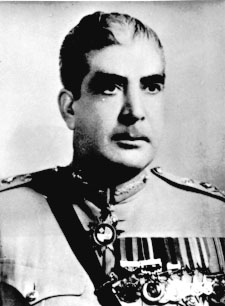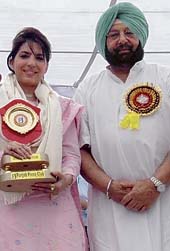
General Yahya Khan

"General Rani" (General's Queen)

Captain Amrinder Singh and Aroosa Alam
| Submit your comments on this article |
| India-Pakistan |
| A tribal state |
| 2007-09-24 |
| By Dr Ayesha Siddiqa Recently, it was suggested at a seminar that Pakistan was in the process of moving from management to governance. This claim was probably looking to the future where a single individuals rule would be replaced by a system of civil-military partnership, where issues would be decided through consensus. It is difficult to see how such a conclusion has been reached considering that decision-making remains largely tribal and feudal in character. The manner in which policymakers address domestic political issues or bilateral ties with other countries does not really match the above-mentioned claim. Let us consider how this tribal/feudal decision-making works, taking as an example the eviction of Nawaz Sharif from the country on September 10. Authorities in Pakistan consider the countrys political future secure after the former prime ministers deportation, as his bid to enter the country was considered a rude disturbance that would have distracted people from the agreement being negotiated between Benazir Bhutto and General Pervez Musharraf. Sharif has not just been deported; it has also been ensured with the help of the Saudis that he is restrained from speaking out and interfering in Pakistans political issues. The decision is considered unpleasant by many. Musharraf should have allowed Sharif into the country, making a positive contribution to the process of reaching national consensus. Instead, Sharif was deported and his followers imprisoned and harassed for trying to protest on the streets. Probably, the understanding in Islamabad is that allowing Sharif into Pakistan would have hampered the future political arrangement as envisioned by the GHQ. The more interesting aspect, however, is the involvement of the Saudis who have played a key role in both of Sharifs deportations. Indeed, we now see that the Saudis wield significant influence in Pakistan. Gone are the days when people used to joke about Pakistan being the 52nd state of the US. Now it seems that we are a satellite state of an American satellite state. There are two explanations for Saudi Arabias involvement in Pakistans political affairs. First, the Saudis were asked by the Americans, especially former President Bill Clinton, to help Sharif. It would have been unpleasant had Pakistans military assassinated another prime minister, and Clinton was concerned about the security of a Pakistani leader who had been quite cooperative. Second, the Saudis were keen to come to the help of Sharif in return for the understanding he had developed with the Saudi ruling family during his tenure as the prime minister. The visiting Saudi crown prince was taken to visit the Kahuta Research Laboratories soon after the nuclear tests in 1998, a gesture which denoted the relative significance of the Saudi royal family. And this influence is not something new. The Kingdom has traditionally played an influential role in Pakistans domestic policymaking starting from the days of General Ayub Khan. On Riyadhs request, Ayub recalled Ahmadi officers serving in Saudi Arabia. Later, the influence increased and was critical in funding Pakistans military acquisitions during the Zia-ul Haq period. The Saudi connection was also prominent in funding the Jihad in Afghanistan, and later in staving off Iranian influence in Pakistan. And it is via personal links that the Saudis have played a significant role in Pakistani politics and society for so long. Bringing Sharif to Saudi Arabia was a kind gesture to both Sharif and Musharraf, who was relieved to get rid of a political problem. Notwithstanding the aforementioned concerns of President Clinton, the fact is that Islamabad could not really have afforded to kill another prime minister. But having Sharif around was adding to Musharrafs problems. This is, in fact, the most interesting commentary on the political behaviour of Pakistans establishment. It chose not to confront the former prime minister legally but to get rid of him. The present regime has decided twice to evict Sharif than confront him with his sins. Interestingly, the former premier was charged with corruption. But instead of taking him to trial, the government exported him to Saudi Arabia. More importantly, the regime decided to honour an agreement between Sharif and the Saudis more than the decision of the Supreme Court of Pakistan. This does not reflect the behaviour of a sovereign country but one that depends on personal linkages with powerful external forces. Or perhaps one needs a less tribal/feudal mindset to recognise the fact that the law must be followed and implemented. Lets now look at how a feudal approach is also applied to the conduct of external relations. In certain cases, personal relationships across borders are directly encouraged by top authorities in Pakistan. What is the objective of sneaking into, say, New Delhis power circles via personal contacts? The most obvious explanation is that the relationship would be a way of fostering greater confidence between the two sides. What could be more wonderful than the Pakistani spouse of an Indian politician explaining Islamabads concerns to the other side? There is historical precedent for such politics. Allegedly, the relationship between Lady Mountbatten and Jawaharlal Nehru was useful for the Indians. But would this approach really work now? The more important question is how the authorities in Islamabad arrived upon the idea that such methods would allow them greater influence in strategic decision-making on the other side. It is perhaps the inherent feudal mindset according to which personal linkages play a significant role in the affairs of the state, and between states. This takes us back to the Europe of centuries ago, when marriages were a method of building important political linkages between kingdoms and empires. But that was a monarchical and feudal Europe in which an individual had a greater role to play than institutions. The problem with a nation-state, as opposed to the historical feudal states or monarchies, is that they operate on the basis of long-drawn objectives, and there are far too many players for such individual-based initiatives to have a major impact on decision-making. Under the circumstances, the real test is not just to move from management to governance but to move away from feudal decision-making to a more structured and logical policy-making system. The writer is an Islamabad-based independent defence analyst and author of the book, Military Inc, Inside Pakistans Military Economy |
| Posted by:john frum |
| #4 Night of The General The woman was a phenomenon. Easily the most influential figure during Pakistan's second military regime, with the slightest gesture of her bejewelled hand she could guarantee employment, ensure promotions and bring about unwelcome transfers. Yet, interestingly, few even know her real name: Akleem Akhtar. General Rani she was, and remains to all but an intimate few. In one interview, Rani stated: "I knew that dumb, pretty girls who come with no strings attached are a universal failing of men in power. After my marriage collapsed and I had to find the means to support myself and my children, I decided to become the provider of such girls to men in need." After he became the martial law adminstrator, Rani became a cornerstone in his life. Yahya's weaknesses were drink and women and Rani masterfully catered to both. Among the women she introduced him to were film actress Taranna - film actress Andleeb's mother - Madame Nur Jehan and Nael Kamal. As soon as Bhutto came to power, General Rani was put under house arrest and her telephone connection was cancelled. Her crime in the words of an eminent lawyer was that, "she knew too much." Thus began General Rani's downfall. Once the issue of house arrest was resolved (courtesy S. M. Zafar) and her subsequent jail terms ended (the most recent for drug-trafficking), General Rani never really reverted to her former glory. |
| Posted by: john frum 2007-09-24 16:44 |
| #3 Amrinder Singh's brother in law is Natwar Singh, the former Indian Foreign Minister (involved in the UN Iraq Oil for Food scandal). His wife, Parneet Kaur, is a Member of the Indian Parliament and reportedly quite a formidable woman. Aroosa Alam broke the story about Brigadier Andrew Durcan, the UK Defence Attache to Islamabad who was recalled to London over an affair with a "researcher" of the Institute of Strategic Studies Islamabad, allegedly an ISI honeypot operation run by ISSI's director, Shireen Mazari. |
| Posted by: john frum 2007-09-24 16:13 |
#2  General Yahya Khan  "General Rani" (General's Queen)  Captain Amrinder Singh and Aroosa Alam |
| Posted by: john frum 2007-09-24 16:01 |
| #1 In certain cases, personal relationships across borders are directly encouraged by top authorities in Pakistan. What is the objective of sneaking into, say, New Delhis power circles via personal contacts? She is referring to the affair between Captain Amrinder Singh (former Chief Minister of the Indian Punjab and son of the Maharajah of Patalia) and Aroosa Alam (Pak Journalist with ISI links, daughter of Akleem Akhtar "General Rani" the mistress of the Pak military dictator Yahya Khan) |
| Posted by: john frum 2007-09-24 15:53 |